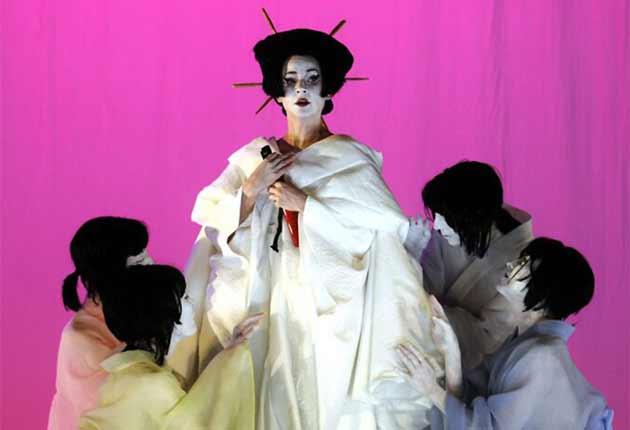Admeto, re di Tessaglia, Festival Theatre, Edinburgh

Some productions are more fun than the sum of their parts. Handel's Admeto, Re di Tessaglia isn't one of his best operas: it doesn't have the melodic or dramatic power of, say, Semele or Alcina. Yet Doris Dörrie's production at the Edinburgh International Festival has a lot of charm, with sunny playing, striking design and some very appealing dancing.
It comes from another festival, the International Handel Festival in Göttingen, Germany. Handel and his librettists start with the story of Alceste, the queen who dies to save her husband Admeto's life, but is brought back from Hades by the hero Hercules. The storyline is complicated by a rival princess hoping to marry Admeto, the rival princess's own suitors, jealousy and disguise. At every stage, the characters stop to discuss their own emotions.
Dörrie sets the story in samurai Japan, a formal world with strict rules of behaviour. The action is framed with plain screens, lit in different bold colours: deep green for the forest, pinks and stark white for court, crimson for hell.
Marie Arnet's Alceste dies in shadow behind a screen. When her death is revealed, we see her lying in a puddle of red silk. As she dies, her soul – danced by the Butoh dancer Tadashi Endo – stands up, rising from her body.
Endo follows Alceste for the rest of the opera, to hell and back again. Does he represent her soul, her fate, or the jealousy she feels on her return? With his long wig and ragged draperies, he's a strange, stark figure, bringing a sense of loss and pain to this staging.
The singers need to find more of it. Arnet is sweet but not particularly distinctive. As Admeto, countertenor Tim Mead sings with a steady tone and clear authority. Kirsten Blaise, as the rival princess Antigona, has vocal charisma and a vivid stage presence. Andrew Radley's Orinde performs some hooting notes and overplayed comedy. Nicholas McGegan conducts a lively performance by the FestspielOrchester Göttingen. Rhythms are bright, with a warm brass and string tone from the players.
Mamu Dance Theatre provides the other highlight. The Japanese style Butoh is associated with angst, but here it's downright cuddly. The dancers pop up as flirty ladies-in-waiting, scampering deer and adorable sheep. Antigona, disguised as a shepherdess, is followed by a loyal sheep, which devotedly protects her from harm – though it does try to nibble her bonsai tree.
Subscribe to Independent Premium to bookmark this article
Want to bookmark your favourite articles and stories to read or reference later? Start your Independent Premium subscription today.

Join our commenting forum
Join thought-provoking conversations, follow other Independent readers and see their replies